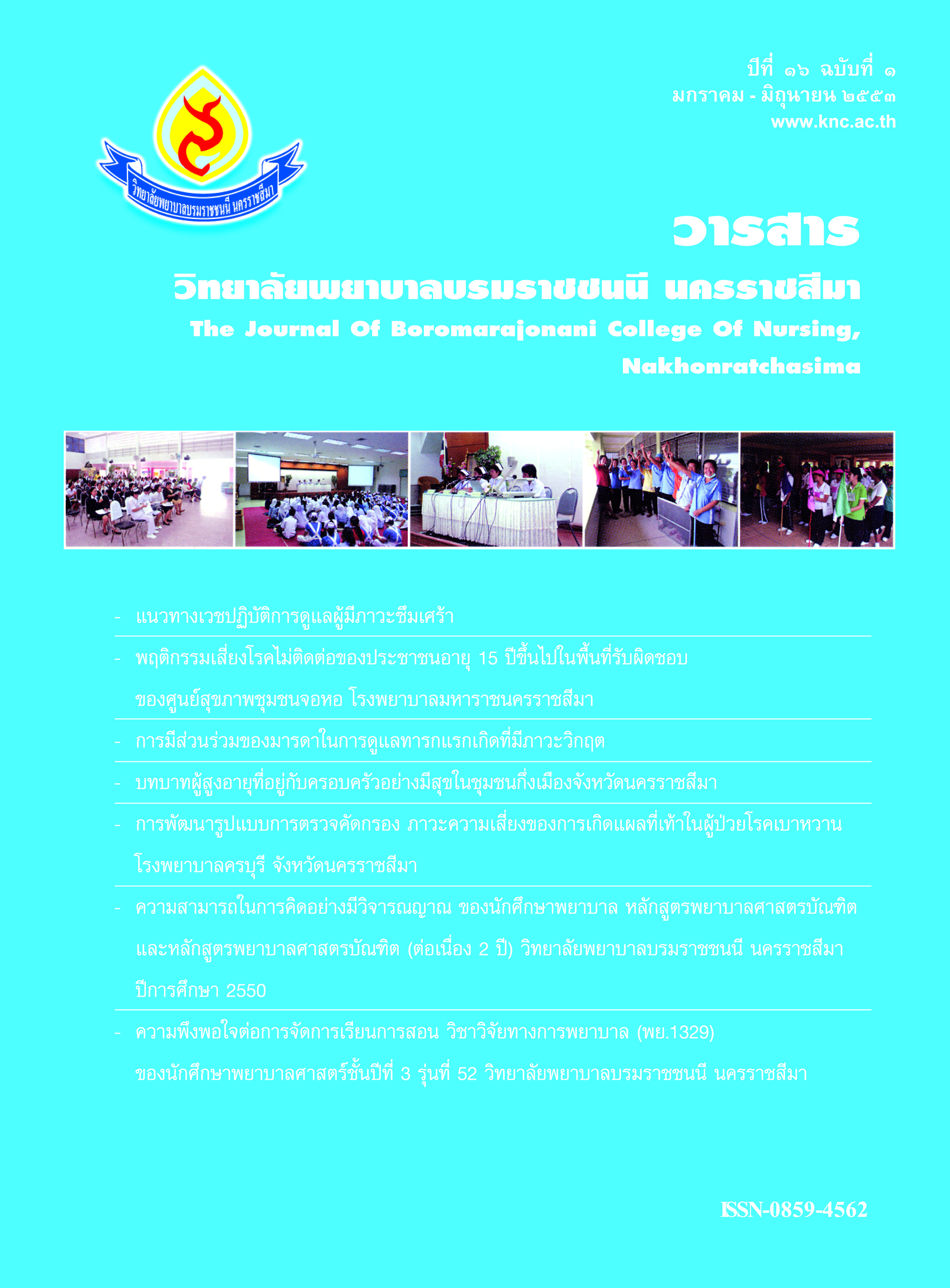บทบาทผู้สูงอายุที่อยู่กับครอบครัวอย่างมีสุขในชุมชนกึ่งเมือง จังหวัดนครราชสีมา
คำสำคัญ:
ผู้สูงอายุ, ผาสุข, older adult, happy-livingบทคัดย่อ
บทคัดย่อ
ผู้สูงอายุมีจำนวนเพิ่มมากขึ้นและผู้สูงอายุอาจเป็นสาเหตุของความขัดแย้งในครอบครัวได้ การวิจัยเชิงคุณภาพนี้มีวัตถุประสงค์เพื่ออธิบายบริบทและลักษณะครอบครัวของผู้สูงอายุในชุมชนกึ่งเมือง ศึกษาการให้ความหมายของคำว่าผู้สูงอายุและสุขภาวะของผู้สูงอายุ ศึกษาบทบาทของผู้สูงอายุ ครอบครัวและชุมชนเพื่อการอยู่อย่างเป็นสุขของผู้สูงอายุ และศึกษาปัจจัยที่มีผลต่อบทบาทของตนเอง ครอบครัว และชุมชนเพื่อให้ผู้สูงอายุอยู่อย่างมีความสุข ผู้ร่วมโครงการวิจัย คือ ผู้สูงอายุจำนวน 46 คน จาก 40 ครอบครัว สมาชิกในครอบครัวของผู้สูงอายุจำนวน 39 คน สมาชิกในชุมชนจำนวน 34 คน เครื่องมือที่ใช้ในการเก็บรวบรวมข้อมูลประกอบด้วย การสัมภาษณ์ข้อมูลทั่วไป การสัมภาษณ์เชิงลึกและการสนทนากลุ่ม วิเคราะห์ข้อมูลเชิงปริมาณด้วยสถิติเชิงพรรณา และวิเคราะห์ข้อมูลเชิงคุณภาพใช้วิธีการวิเคราะห์เนื้อหา ผลวิจัยพบว่า ผู้ร่วมโครงการวิจัยส่วนใหญ่ (95.65%) มีอายุระหว่าง 60 -79 ปี เป็นเพศหญิง (73.91%) อาศัยอยู่ในชุมชนกึ่งเมืองที่อยู่กันอย่างหนาแน่นระหว่างรอยต่อของเขตเทศบาลตำบล ผู้สูงอายุ คือ ผู้ที่อายุมากแล้วแต่ยังสามารถประกอบภารกิจประจำวันได้ ผู้สูงอายุที่อยู่กับครอบครัวอย่างมีสุขต้องสามารถแสดงบทบาทในการดูแลสุขภาพตนเอง ดูแลตนเองด้านจิตใจและจิตวิญญาณ เลี้ยงดูหลาน และมีบทบาทในชุมชน ครอบครัวและชุมชนมีบทบาทในการดูแลผู้สูงอายุ 4 ด้าน คือ ด้านร่างกาย จิตใจ สังคม และเศรษฐกิจ สิ่งที่มีผลต่อการแสดงบทบาทของผู้สูงอายุ คือ ด้านภูมิหลัง ด้านครอบครัว และด้านชุมชน การแสดงบทบาทที่เหมาะสมของผู้สูงอายุ ครอบครัวและชุมชนเป็นปัจจัยที่ส่งผลให้ผู้สูงอายุมีความสุข บุคลากรที่เกี่ยวข้องควรสนับสนุนให้ผู้สูงอายุ ครอบครัว และชุมชน มีส่วนร่วมในการทำกิจกรรมของผู้สูงอายุอย่างต่อเนื่อง
คำสำคัญ : ผู้สูงอายุ, ผาสุข
Abstract
The number of older adults is increasing and families living with them may have conflicts among their members. This qualitative research aimed to 1) describe context of suburban communities in which the older adults live, 2) explore meaning of an older adult and their well-being, 3) reveal roles of an older adult in their families and communities in relationship to their well-being, and 4) explore the influencing factors and roles affecting older adults’ well-being. The research was conducted between 2006 and 2007 in sub-urban communities in Nakhon Ratchasima Province. Key informants were 46 older adults from 40 families. General informants were 39 family members and 35 community members. Data was collected by using in-depth interviews and focus group discussions. Quantitative data was analyzed by using percentage, while qualitative data was analyzed by using content analysis. The results showed that the majority of older adults’ age range was between 60 – 79 years old (95.65%) and that most of them were female (73.91%). The older adults live in crowded suburban communities. An older adult was defined as an older person who is able to do his or her own routines. Well-being of older adults living in families is achieved if they are able to play five roles. Namely taking care of their physical, mental, and spiritual health, caring for grandchildren, and having roles in the community. Families and communities influence four aspects of an older adults’ well-being which are physical, mental, social, and economic. Some factors related to older adults’ roles are personal background, family position, and community involvement. Older adults having appropriate roles in their families and communities, contributes to their well-being. Therefore, health care and other providers should promote parties involved having their own roles.
Keywords : older adult, happy-living
ดาวน์โหลด
ฉบับ
ประเภทบทความ
สัญญาอนุญาต
บทความที่ได้รับการตีพิมพ์เป็นลิขสิทธิ์ของ วารสารสุขภาพและการศึกษาพยาบาล ซึ่งดำเนินการโดยวิทยาลัยพยาบาลบรมราชชนนี นครราชสีมา
ข้อความที่ปรากฏในบทความในวารสารเล่มนี้เป็นความคิดเห็นส่วนตัวของผู้เขียนแต่ละท่านไม่เกี่ยวข้องกับกองบรรณาธิการวารสารสุขภาพและการศึกษาพยาบาล หรือวิทยาลัยพยาบาลบรมราชชนนี นครราชสีมา แต่อย่างใด ความรับผิดชอบองค์ประกอบทั้งหมดของบทความแต่ละเรื่องเป็นของผู้เขียนแต่ละท่าน หากมีความผิดพลาดใดๆ ผู้เขียนแต่ละท่านจะรับผิดชอบบทความของตนเองแต่ผู้เดียว







